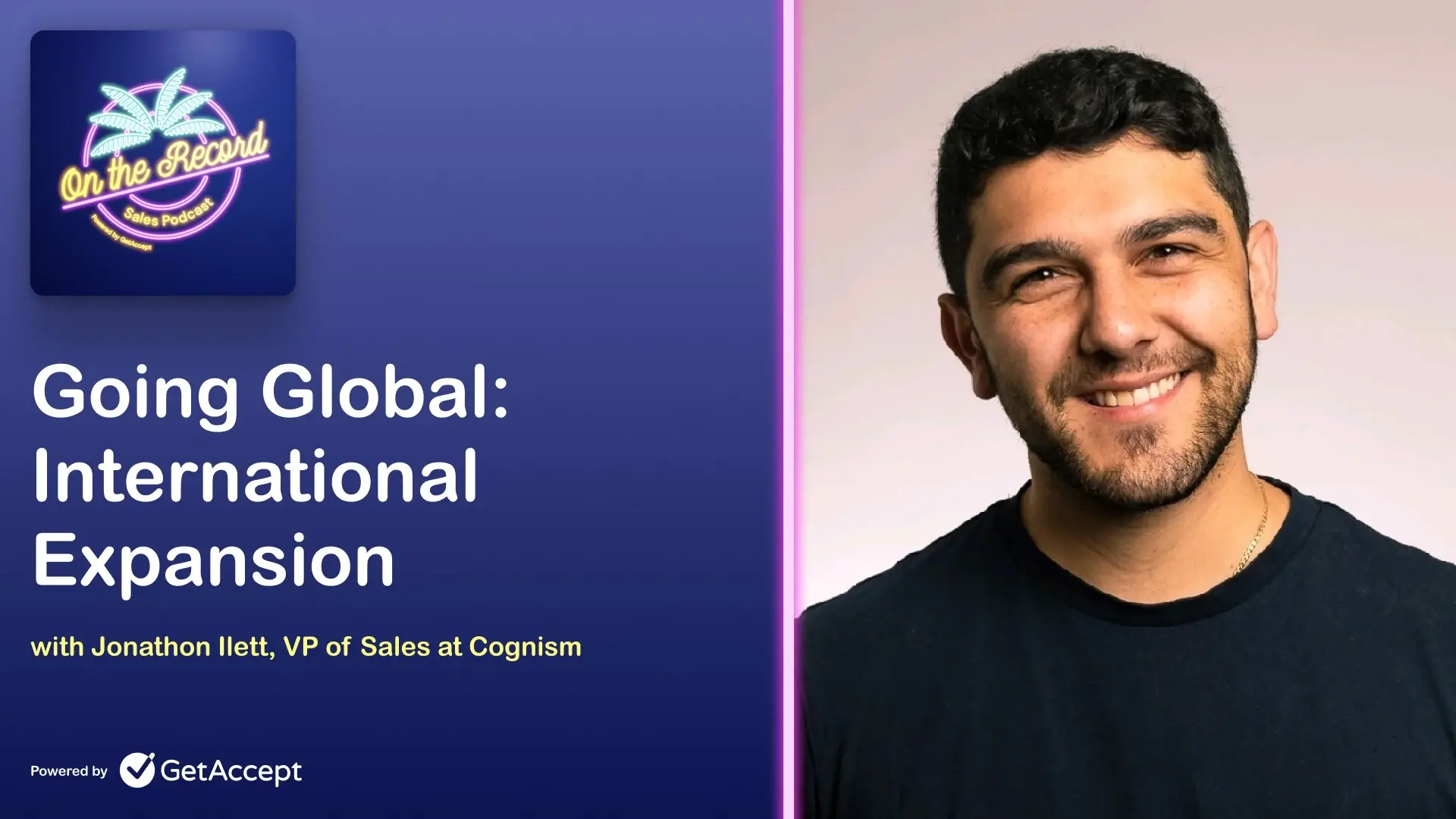Scaling a sales team is tough.
Scaling an international sales team?
That's like trying to solve a Rubik's cube while juggling balls in the air.
Not something I would recommend, by the way.
You see the image I am trying to paint here.
It’s extremely tough to do.
I've watched countless companies crash and burn because they thought expanding globally was a simple process.
Well, if you have crashed and burned trying this technique or starting to think about expansion, I figured interviewing someone who has already done this successfully might be helpful.
Jonathon Ilett from Cognism knows this landscape better than most.
When I asked Jonathon about his favorite place to visit, he immediately lit up, talking about Istanbul.
He frequently visits the city for its vibrant energy and incredible food scene.
This appreciation for different cultures isn't just a personal preference, it's central to his business philosophy.
Check out the full interview with Jonathon
The cultural foundation
Before you decide to expand globally, understanding culture isn't just important – it's everything.
What works in one country can fail in another.
Take France, for instance. Sales there is a hierarchical puzzle you solve by building relationships from the bottom up. Try that same approach in the U.S. or UK, and you'll get nowhere fast.
Jonathon shared a humbling experience from their first summer in the French market: "We'd heard August was a slow month, but we weren't prepared for the reality. The entire country essentially shuts down for business. It was so dramatic that we had to completely readjust our annual forecasting – there's simply not enough people working in August to justify having a target."
Know your cultural foundation before you even consider the region you want to move into.
Smart market testing
Here's how successful leaders start testing if they've picked the right international market:
- Start with small marketing investments
- Track conversion rates obsessively
- Analyze market appetite
- Focus on key metrics like Net Dollar Retention
The goal isn't just to expand to expand.
It's finding those "greenfield" markets with zero competition and massive potential.
The APAC experiment
Take their Asia-Pacific expansion. Instead of throwing money at the problem, they:
- Verified sufficient inbound revenue first
- Moved a high-performing account executive to the region
- Started with a minimal, focused team
Each region requires a different approach, but understanding the culture and market appetite first has helped them find more successes than failures.
You need the right people that are focused on the problem.
The people factor
Your top performer in one region might ruin the culture in another one.
Here is a real-time example to show you how this can go terribly wrong.
Jonathon's first international hire looked perfect on paper. He was a top performer from a major corporation.
In reality, they were completely wrong for the new market.
Why?
Because having the right skills means nothing without understanding the culture and dynamic you need to bring into the region.
Hiring the right sales reps and leaders should have a specific process when you are looking to bring someone into another region.
They are going to carry the energy to the next level.
The time zone challenge
Most people don't talk about the logistical nightmare of managing international teams.
Context switching between different times and cultures can be difficult.
However, Jonathon's team had a process that they mastered:
- Managing calls across multiple time zones
- Creating flexible working structures
- Developing communication protocols that work globally
- Ensuring team cohesion despite physical distance
Creating clear boundaries with your schedule is critical, otherwise, you will be doing a ton of back and forth with your team that will derail your performance.
Master your schedule so your team can excel at the highest level.
The location strategy
Location matters more than you think.
This is how Jonathon recovered from a critical mistake they made.
Cognism initially set up in Cologne because their leader was based there.
The problem?
Cologne isn't a tech hub, making hiring extremely difficult.
Clearly that is an issue if you are looking to get top talent and want to build an in-office culture.
So they switched it up.
They are now focusing on establishing offices in major tech hubs like Paris, Boston, and Sydney, making it easier to attract and retain talent.
Think about the areas where you can attract talent and then build from there.
The long-game strategy
International expansion is a marathon, not a sprint.
"These new regions might generate minimal revenue initially," Jonathon explains, "but you're building foundations for future scale."
When thinking about expanding, think about how you are building a house from the ground up.
The foundation of a house doesn't look pretty until you see the finished product.
Key factors for long-term success:
- Full organizational commitment
- Transplanting company DNA through key people
- Consistent face-to-face connections
- Building genuine, personal relationships
- Investing in learning, not just selling
The real journey
Global expansion isn't about planting flags or checking boxes. It's about understanding human dynamics, cultural nuances, and playing a patient strategic game.
Jonathon didn't just expand internationally. He wrote a playbook for intelligent, thoughtful global growth.
Now you have the blueprint on how you can do it, too.
Want to hear more insights from my conversation with Jonathon? Check out the full interview on Revenue Rebels On the Record.




